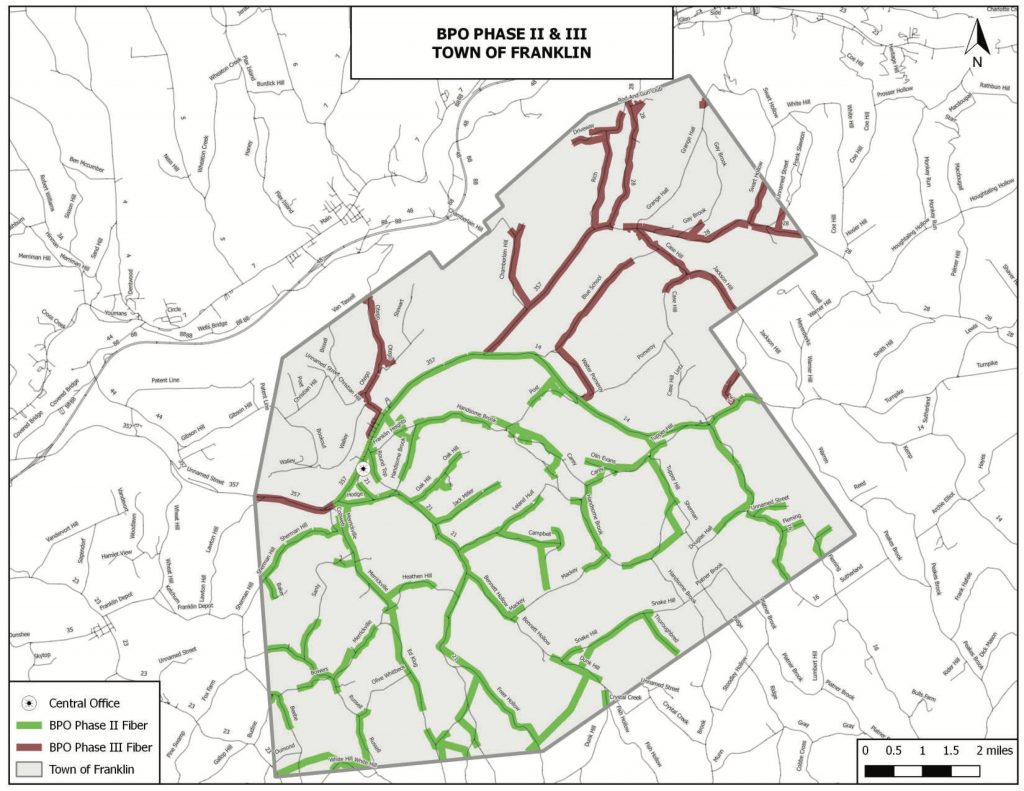This year, the option of phone, video, and internet via fiber-optic cable is coming to many in Franklin as an alternative to the existing service via copper-wire cable. Long-time provider, Frontier Communications Corporation, has been the bane of local businesses and homeowners with its slow data transmission rates and poor service.
All last year, the contractor for Delhi Telephone Company, CCLD/Eustis Cable, was busy laying the network of cable for bringing their service to much of Franklin. Its contractor also built an equipment shed next to the cell tower at the town garages and installed the necessary switching equipment.
The contractor strung seventy miles of cable along roads past 870 potential customers. (Franklin has 118 miles of town and county roads, some of which are already strung with high-speed internet.) Work ran longer than expected because the utility easements had not been maintained, and much tree trimming was required. Pruning by Asplundh Tree Service and cable installation continued throughout 2018 and into this year. Workers are expected to finish in a month or so. A further speed bump was NYSEG’s slowness in processing applications for permission to attach to their utility poles.

This only puts you on a list to be scheduled and does not obligate you to connect.
Once the road work is completed, sometime in July, DTC will make a presentation before installations begin. Appointments will be Monday through Saturday. While property owners can install their own equipment to the network, the technician must be able to enter the building to install the outlet. Service visits should continue through 2020.
Installation is free. While the enabling grant requires DTC to install only up to 150 feet from the road for free, company will do so for distances a few times greater. However, DTC will only string along existing poles or through existing buried conduit. For new underground installation, landowners will have to trench across their property and bury conduit.
Once all the cable for the current Phase II is strung, this summer roadwork will begin on Phase III, north of State Highway 357, with completion aimed at for the end of this year.
DTC will offer phone, video, and internet in various combinations and options. Combinations with the least expensive options range from monthly $60 (internet) to $100 (all three), not including fees and taxes. The rate schedule for Franklin will be the same as surrounding towns, which are listed here:
Basic transmission rate is 75 million bits per second (download) by 10 (upload). This should meet the needs of most homeowners unless yours is a big family, you work from home, or there is multi-player gaming. (House phone and cell phones would use some of this data feed.) For those willing to pay extra, speeds of up to 1,000 by 1,000 Mbps are available. None of the options put an upper limit (cap) on the total amount of data each month.
For an additional $8 per month, DTC will provide the Wi-Fi hardware. That adds up to almost a $100 a year, year after year. But for customers with little or no knowledge of hardware, this convenience might be worth it.
More details can be read in a previous article Fiber-Optic Finally in issue number 32.
This deployment of fiber-optic is made possible by a grant to Delhi Telephone Company and DTC Cable, as part of the Delaware County Broadband Initiative, by State of New York through the New NY Broadband program.
Note: you may have seen blue and white signs on utility poles, offering HIGH SPEED INTERNET. This is for a competing internet provider. Its communication network uses a satellite above and dishes below, with slower transmission rates and a cap on data for all but the most expensive option. Its basic transmission rate is 12 by 3 Mbps with a cap of 25 gigbytes for $85 a month. Broadcast transmission can be degraded by precipitation.
Brian Brock is president of the Greater Franklin Chamber of Commerce.
